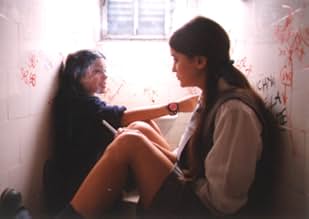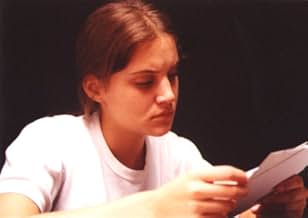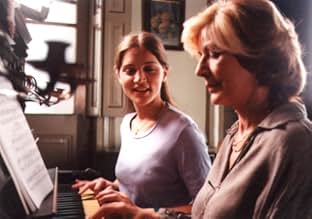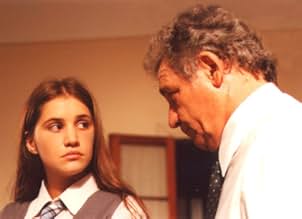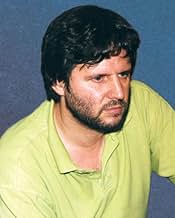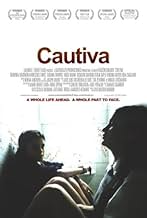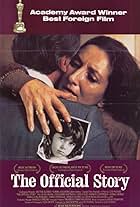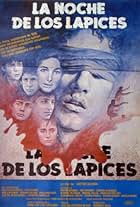Cristina's life is thrown into turmoil when she is suddenly escorted from her strict Catholic school in Buenos Aires and told that she is really Sofía Lombardi, the daughter of activists who... Read allCristina's life is thrown into turmoil when she is suddenly escorted from her strict Catholic school in Buenos Aires and told that she is really Sofía Lombardi, the daughter of activists who disappeared in the '70s. Questioning everything she once thought true, Cristina embarks o... Read allCristina's life is thrown into turmoil when she is suddenly escorted from her strict Catholic school in Buenos Aires and told that she is really Sofía Lombardi, the daughter of activists who disappeared in the '70s. Questioning everything she once thought true, Cristina embarks on a journey to find her true identity. Meeting others like herself, the young girl soon di... Read all
- Awards
- 5 wins & 13 nominations total
- Director
- Writer
- All cast & crew
- Production, box office & more at IMDbPro
Featured reviews
Is there any worse thing than what happens here? I can't think of more than one (murder, in all its forms). I think even rape is "less bad"! Before turning this into a "moral philosophy", let me point at the scenes I liked most: 1) When Sofía and her expressive Spanish friend have this important talk about life, surrounded by soccer. Now as before, quenching everything that matters. The "paralelism" is challenger indeed! 2) Having Ives's "The unanswered question" as a musical score when... (I can't say more!) 3) Final scene (aerial take, Handel?) 4) The shower scene, between the two now women, "naked" in more than one sense 5) The brawl between the Quadris and Sofia. An one moment, Pablo starts treating Sofia as a stranger, almost an enemy. Suddenly, her "dear daughter Cristina" is dead, even before he hits her. (maybe a bit predictable I guess) 6) (you may laugh) "The nightmare". It made me realize true horror is not what Hollywood sells us, it's opening a door into the unknown (in her grandma's or aunt's house) and finding a glimpse of a life frozen in time (her dead mother's). The film luckily avoids many pitfalls. Has only one very unbelievable moment, when a nun's teen escapes from Tribunales, from the same savvy cops who reduce the also hard boiled Pablo Quadri. Tribunales' zone is very WELL FILMED, feels absolutely real to somebody like me who's hanged around there very often. Retiro, the trains, both schools... It's a very Argentine film! By the way, found it great how she "downgraded" economically from her rather posh house in the suburbs to her grandma's "dark old house" & derelict Citroen! The contrast between the nun's school, which is not luxurious but looks like when compared to the truly depressing state school!
I was surprised about the performances! Have to say I didn't expect much from this film, for a) I don't like Argentine cinema b) the subject is normally a sign of a tsunami of clichés c) didn't have much faith in Lombardero. When I saw "Hugo Arana" I feared the worst :) I had to gulp my prejudices, they both acted surprisingly subduedly, without overemphasis. I had my "lesson", they taught it to me. I would have liked to know what was being played during the film, I loved the usage of classical music throughout the film (not in just a couple of broken scenes). My kudos to the director, of whom I knew nothing, and who (thanks IMDb!) has been a "sound editor" in mainstream American cinema! Well, I hope he continues to surprise us!
"Captive" complements the film "The Official Story" very well and emphasized the importance of historical memory, both for a country and for an individual. Cristina, like Alicia ("The Official Story"), is blissfully living in ignorance of the truth until someone else brings it to her attention. Both female characters are at first doubtful of the fact that so many people simply "disappeared". Their doubt then turns to belief and surprise that they didn't know earlier.
Did you know
- TriviaA statement at the end of the film reads "Those responsible, except for a few cases of house arrest, are free." This changed on July 5, 2012, when the first sentences for baby theft from political prisoners during the 1976-1983 "dirty war" were handed down. The longest went to former leader Jorge Videla, who was found criminally responsible for overseeing the systematic theft of babies, and given the maximum sentence of 50 years in prison.
Details
Box office
- Gross US & Canada
- $16,259
- Opening weekend US & Canada
- $2,220
- Nov 12, 2006
- Gross worldwide
- $16,259
- Runtime1 hour 55 minutes
- Color
- Sound mix
Contribute to this page



